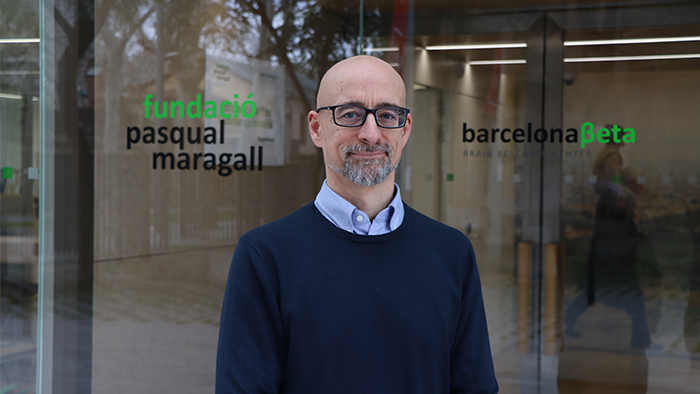05 Mar | 2025
Salvador Macip joins the Barcelonaβeta Brain Research Center

Dr. Salvador Macip joins the BBRC
Dr. Salvador Macip, Professor of Molecular Medicine at the Universitat Oberta de Catalunya (UOC) and the University of Leicester (UK), has joined the research center of the Pasqual Maragall Foundation, the Barcelonaβeta Brain Research Center (BBRC), as the leader of the new Research Group on the Biology of Neurodegeneration and Ageing. This new group will investigate the biological mechanisms of ageing and their relationship with Alzheimer's and other neurodegenerative diseases, with the aim of developing diagnostic, prognostic, and therapeutic tools.
Dr. Macip has over 25 years of experience in studying the biology of ageing and will bring an innovative perspective to the center to enhance the understanding of the mechanisms contributing to the onset and progression of Alzheimer's and other age-related neurodegenerative diseases.
"With this new group, we take another step toward the future of Alzheimer's research, exploring new strategies for its diagnosis and treatment. Our goal is to transform knowledge into solutions that slow the disease and improve people's lives," says Dr. Salvador Macip. "It is a privilege for me to be part of a research center with a top-tier team and such a clear mission: ‘a future without Alzheimer’s,’ a future with healthier ageing for everyone," Dr. Macip adds.
With Dr. Macip's incorporation, the Barcelonaβeta Brain Research Center strengthens its position as a leader in Alzheimer's and neurodegenerative disease research. In this regard, Dr. Arcadi Navarro, director of the Pasqual Maragall Foundation and the BBRC, states that "Dr. Macip reinforces our unwavering commitment to cutting-edge research to find solutions for Alzheimer's and neurodegenerative diseases. Investing in science and innovation remains the key combination to achieving our goal. We are proud to welcome such an outstanding talent to our team, whose international career and dedication to science enrich our mission."
Pioneering research in the biology of ageing
The Biology of Neurodegeneration and Ageing Research Group will study the cellular and molecular processes that drive brain deterioration, with a special focus on the role of senescent cells. Senescent cells are those that stop dividing as they age but do not die, accumulating in the body and potentially contributing to the development of neurodegenerative diseases such as Alzheimer's.
The research will focus on developing blood and cerebrospinal fluid biomarkers to improve disease risk prediction and progression monitoring, as well as new therapies aimed at eliminating these cells and modulating their impact on the brain environment.
To bring laboratory advances into clinical practice, Dr. Macip’s group will combine animal models, clinical sample analysis, and omics technologies to accelerate the application of their findings in medicine. Their expertise in biomarker identification and the development of new therapies places them at the forefront of neurodegeneration research.
The new group joins the four existing BBRC research teams, made up of multidisciplinary professionals and researchers with extensive experience in Alzheimer's disease pathophysiology, genetics, data processing and analysis, fluid biomarkers, cognition, neurochemistry, and neuroimageing.
About Dr. Salvador Macip
Dr. Salvador Macip obtained his medical degree in 1994 and a PhD in Molecular Genetics and Human Physiology in 1998 from the University of Barcelona. He has dedicated his career to studying cancer and ageing at prestigious institutions such as Mount Sinai Hospital in New York. Since 2008, he has led the Cancer and Ageing Mechanisms Laboratory at the University of Leicester, and since 2020, he has been the Director of Health Sciences Studies at the Universitat Oberta de Catalunya (UOC). He will combine these roles with leading this new research group at BBRC.
Dr. Macip has an extensive and renowned international career and is also one of the most recognized science communicators, regularly collaborating with various media outlets and authoring more than 40 books on science and literature.









